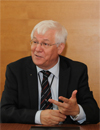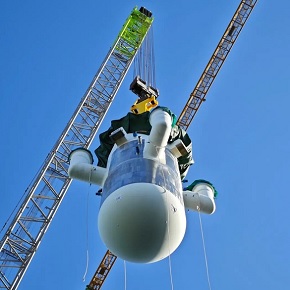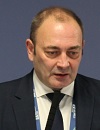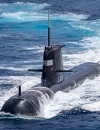NPP Belene
 Belene - another termination
Belene - another termination
The Bulgarian government has once again announced the termination of the Belene NPP construction project.
On Wednesday, October 11, 2023, the government decided that the unfinished Belene NPP was losing its status as a national facility.
In addition, the government instructed the Ministry of Energy to take steps to cancel the procedure for selecting a strategic investor for the Belene NPP, announced by the National Electric Company (NEC) of Bulgaria.
The NEC should send a notice of cancellation of the procedure to companies previously selected as preferred candidates for the role of strategic investors. These are the Chinese corporation CNNC, a subsidiary of Rosatom...
Nuclear News Ticker - January 23, 2021
Nuclear News Ticker - January 19, 2021
Belene arbitration will not be ended till September 2015 - minister
 Yanko Yanev: the 0-0 game
Yanko Yanev: the 0-0 game
Unfortunately, we live in this age of narrow political thinking. Each of our politicians think how to survive, whether he will be the next convocation of the parliament or the government or not.
So he finds support from a particular lobby. If he would contact the anti-nuclear lobby, he will cry how bad is the Belene project. If he is supported by the nuclear lobby, he would insist on the resumption of construction of Belene nuclear power plant.
This situation is not conducive to normal development. We must move away from lobbying approach. Instead, we have perform an objective evaluation of the energy system in Bulgaria.
We have now 35% of electricity generation produced by nuclear power plants. It was 50%, but when four VVER-440 units have been closed the nuclear fraction of power balance was downed to 35%. If we build a pair of reactors-thousanders, we will again meet 50% mark.
Despite such a large share of nuclear generation, we still do not have a clear understanding of how nuclear power will be developed in Bulgaria.
Russia, Bulgaria Discuss Belene NPP Project
Bulgarian Right Wing Queries Belene NPP Referendum
RWE Quits Bulgaria NPP Project over Lack of Funding
Bulgaria to Freeze Belene NPP Talks
Bulgaria Abandons Belene Nuclear Plant
Atomstroyexport sues Bulgarian power firm for 58m euros
Russia, Bulgaria to sign EPC contract on Belene nuclear plant
Russia, Bulgaria sign memorandums on Belene nuclear plant
Russia submits final cost estimate on Belene nuke plant to Bulgaria
Russian first deputy PM to discuss pipeline, NPP projects in Bulgaria
Russia has no word on Bulgaria scrapping pipeline project - energy minister
Bulgaria seeks Russian loan to fund nuclear plant construction
Atomstroyexport fulfills its obligations under Belene NPP construction project
Atomstroyexport has signed a development of documentation contract with the AREVA NP company
A concrete plant started production at Belene NPP site
On February 16th, 2009 the first module of the concrete plant which started to produce concrete for Belene NPP construction in Bulgaria was put into operation.
The concrete production plant is located on Belene NPP construction Site and consists of two modules of capacity of 100 cubic meters of concrete per hour. Commissioning of the second module is scheduled for late February 2009.
Construction of the concrete plant and provision of Belene NPP Site with the ready-mix concrete for the period of the whole construction is in the scope of responsibility of Atomstroyexport JSC subcontractor - SD Mistral-TSS-Stoyanova, Stoyanov Bulgarian company, with which the relevant contract has been concluded.
Commissioning of the concrete plant is carried out as per the schedule in order to ensure active continuation of civil works at the Site.
Signing of Addenda 6 and 7 to the Agreement of November 29th, 2006 that are under consideration in the Ministry of Economy and Energy of Bulgaria at present is expected till the time of first concreting.
 The two lives of the second nuke
The two lives of the second nuke
The second Bulgarian nuclear power plant will have two lives. The first one was a socialist one, and the second - capitalistic. Initially, it was erected to the glory of the everlasting friendship among peoples from the Eastern bloc, and now it is going to be completed for the sake of global energy safety. The first life was cut short with the start of political changes. Could it resurrect at the second attempt?
The first life of the Belene NPP (The Second Nuke) began in 1984. The USSR and Bulgaria signed an agreement on constructing a nuclear power plant on the bank of the Danube River. In case it was done, the energy system of the Balkan republic could have another 2,000 megawatts for starters.
The site was located right across the biggest Danubian island, Belene and just 7.5 km away from the border with Romania. Though the reactors, offered to the Bulgarians, were designed in the USSR, it was the Czechs, and to be more precise, Skodaexport, who contracted the production and assembly of the major equipment. Soviet experts handed all the technological documents and know-how over to the Czechs.
Russia hopes to sign Belene NPP contract this year - President Putin
Bulgaria reporting progress in quest for energy security
Daily roundup from Russia - February 14
ASE wins tender for Belene NPP construction in Bulgaria






